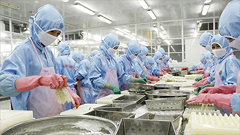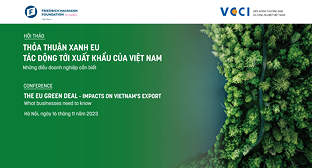How to speed up exports of processed foods to Japan?
29/06/2022 12:08

In order to strongly promote the export of processed foods to the Japanese market, enterprises must pay special attention to ensuring the quality of goods. It is necessary to establish a close link channel, ensuring synchronization and smoothness in all stages from production to storage, transportation and export.
According to the Ministry of Industry and Trade, in the context of Vietnam's import and export around the world being significantly affected, the Japanese market is still a bright spot. In 2021, the total bilateral trade turnover between Vietnam and Japan will reach US $ 42.7 billion, up 7.8% compared to 2020; in which Vietnam's exports to Japan reached US $ 20.1 billion, up 4.4%.
The latest statistics show that, in the first five months of this year, Vietnam's export turnover to Japan reached US$9.34 billion, up 12.8% over the same period last year.
In Japan, the number of people from Asian countries currently living and working is up to ten million people, and the number of Vietnamese people has increased very rapidly in recent years, with statistics showing nearly 500,000 people in 2021.
“Processed food products imported from Vietnam are more and more widely known and well received by the Japanese, the Vietnamese community and people of other Asian countries, with good consumption in the Japanese market,” Mr. Le Hoang Tai, Deputy Director of the Trade Promotion Department (Ministry of Industry and Trade) said at a online trade conference on processed foods between Vietnam and Japan 2022 on June 23.
It is notable that a number of Vietnamese products have successfully penetrated into the distribution chain in Japan, including coconut water and coconut milk, which are imported and distributed by KOME Company for the chain of stores selling Vietnamese goods in Tokyo and neighboring provinces; likewise, Vietnamese coffee products that have been imported and sold at the OK supermarket chain - a very popular supermarket chain in Tokyo.
In addition, Vietnam's agricultural, aquatic and food products are increasingly popular with a variety of categories on the shelves of major supermarket chains in Japan such as AEON, Donkihote and Itoyokado.
Vietnam and Japan are both members of four bilateral and multilateral free trade agreements (FTAs), including the Vietnam-Japan FTA (VJEPA), and the Regional Comprehensive Economic Partnership Agreement (RCEP), ASEAN-Japan FTA (AJCEP) and the Comprehensive and Progressive Agreement for Trans-Pacific Partnership (CPTPP).
Therefore, between the two countries there are many opportunities and favorable conditions to expand trade cooperation in many fields, including processed food.
"Vietnam's processed food products have a lot of potential to be exported to Japan in the near future," said Mr. Le Hoang Tai.
According to Mr. Ta Duc Minh, Commercial Counselor of Vietnam in Japan: Japanese people care most about food quality. The Japanese government promulgates many laws and regulations to manage the quality of imported agricultural, aquatic products, and foodstuffs, focusing on product traceability.
Besides, household sizes in Japan are shrinking. Busy working lives makes Japanese people prefer convenience food products (easy to cook or processed, packaged in small bags and sold at all major supermarket chains and convenience stores).
Regarding issues to note when exporting agricultural, aquatic products and foodstuffs to Japan, according to Mr. Minh, the quality and brand name of exported products must always be ensured. Enterprises need to establish a close linkage channel, ensuring synchronization and smoothness in all stages from production to preservation, transportation and export. At the same time, export goods need to have a variety of tastes, improvements in design and packaging to catch the eye and attract customers.
Japanese consumers are quite sensitive to changes in prices. Therefore, Japanese importers always appreciate the stability of prices as well as supply from Vietnamese enterprises.
Source: Customs News
Các tin khác
- Businesses capitalize on recovery momentum to explore market expansion (17/04/2024)
- Canada is second largest consumer of Vietnamese pangasius in CPTPP bloc (17/04/2024)
- India’s tariff removal on several US products benefiting farmers: Katherine Tai (17/04/2024)
- Thailand Contemplates Protective Tariffs on Chinese Imports Amidst Surging Trade Deficit (17/04/2024)
- Vietnam becomes largest banana exporter to Chinese market (17/04/2024)
 Home
Home
 About Us
About Us




















